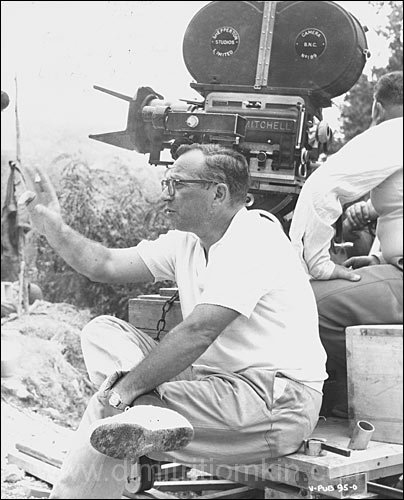Part 2 of 2.
By Warren M. Sherk
In late December 1960 when Dimitri Tiomkin withdrew from scoring the Robert Aldrich film Day of the Gun—the working title for The Last Sunset—the explanation given in the press was Tiomkin’s partnership with Cinerama producer Lowell Thomas, who was producing a biopic on Benjamin Franklin.
READ: December 2018: Why did Dimitri Tiomkin bow out of scoring two Robert Aldrich films? (part 1)

Carl Foreman
In early January 1961, the suddenly-free Tiomkin flew to London to meet with Carl Foreman, the producer and screenwriter for The Guns of Navarone, a film that Columbia Pictures had acquired the film rights to in 1957 and had wrapped principal photography for in October 1960.
Tiomkin went on to score the film and the world premiere of Guns of Navarone took place in London on April 27, 1961. Four months after the Chicago opening of The Last Sunset, featuring Tiomkin’s song “Pretty Little Girl in the Yellow Dress,” in late October 1961, director Robert Aldrich asked Tiomkin to score his next film, the biblical epic, Sodom and Gommorah.
In mid-November Tiomkin arrived in Rome to take part in a press conference for Sodom and Gommorah, returning home the first weekend in December to complete scoring Without Each Other. At the same time he was negotiating a deal to score How the West Was Won and signed a contract to score Marco Polo for Raoul Levy. By mid-December 1961 Tiomkin had signed on to score How the West Was Won, to begin in January 1962.
READ: February 2016 The magnificent adventure of the abandoned Marco Polo
Meanwhile, Robert Aldrich flew from Rome to Los Angeles to meet with Tiomkin just days before Christmas in 1961. A little more than two months after that meeting, the terms of Tiomkin’s contract for Sodom and Gommorah were made public.
But all was not well, in a 1962 interview with George Addison published in Robert Aldrich: Interviews, the director speaks of creative differences with Tiomkin on Sodom and Gommorah.
I wanted Dimitri Tiomkin to do the music score. Well, they didn’t want to spend the money and who needs an American composer, etc. But I kept arguing that Tiomkin would be great and finally I wore them down. Tiomkin was signed up and he charged them a fortune! He came over to Rome to look at the picture and he sits down in the cutting room. We get down to the last reel and I could sense he wasn’t totally happy and I came up to him near the end and he said, ‘I don’t buy it.’ I asked him what he meant. He said, ‘I don’t buy the concept.’ I said, ‘What do you mean you don’t buy the concept? What don’t you like?’ He said, ‘I don’t believe she turned to salt.’ I just sat there and dropped my head. Finally I got up, put on my coat, and started out of the room. He said, ‘Where are you going? What can I do? What can I say? I can’t do anything I don’t believe in.’ I asked him, ‘What the hell would you have me do? Re-shoot it, re-write, the Bible? You don’t buy the concept! Now how in hell am I going to combat that?’ We had a very unpleasant farewell in the cutting room. Finally I walked out with a few four-letter words. And the funny thing is—like the joke where the guy gives the headwaiter hell and then has to go back to get his briefcase—we both end up on the same plane to Paris! He sat at one end of the plane and I looked this way and he looked the other. Of course, I was furious, but later, you know, after two or three months, it was funny. I think it’s a riot now, but it wasn’t funny then.”
The fortune that Aldrich mentions did result in a prominent headline on the front page of Daily Variety, “Tiomkin Getting 62½G To Score ‘Sodom’; A Record,” on March 8, 1962. He was to start scoring Sodom after completing How the West Was Won.
Taking the trade paper announcement into account, the anecdote told by Aldrich would seem to have taken place sometime after March 8.
In any case, eye surgery for a detached retina in late March 1962 forced Tiomkin to exit scoring How the West Was Won as well as Sodom and Gommorah. Composer Miklos Rozsa replaced Tiomkin on Sodom and Gommorah by March 28th and earlier that week Alfred Newman took over scoring How the West Was Won.
Did the release as Sodoma e Gomorra in Italy in 1961 have a music score? While the American Film Institute catalog notes, “One Italian source credits Dimitri Tiomkin with music,” there is no evidence he provided any music for the film which was released in France in 1962 and the U.S. in 1963.
Aldrich himself regarded Sodom and Gommorah as a “marvelous experience” but a “terrible film.”
Sources
“Tiomkin Tubes ‘Sodom,’” Daily Variety, November 20, 1961
“Tiomkin Near Deal To Tune M-G [Metro-Goldwyn] ‘West’” Daily Variety, December 4, 1961
“Firm Tiomkin Deal To Tune Up ‘West’” Daily Variety, December 15, 1961
“Who’s Where,” Daily Variety, December 21, 1961. [Robert Aldrich jets in from Rome today to meet with Dimitri Tiomkin on score of ‘The Last Days of Sodom and Gommorah.”]
“London Report” by Anthony Gruner, Boxoffice, January 9, 1961 [in London with Foreman]
“Tiomkin Getting 62½G To Score ‘Sodom’; A Record,” Daily Variety, March 8, 1962
“Tiomkin’s Eye Surgery,” Variety, April 4, 1962
Body and Soul: The Cinematic Vision of Robert Aldrich by Tony Williams, Scarecrow Press, 2004 [“terrible film,” and “marvelous experience,” page 235]
Robert Aldrich: Interviews, edited by Eugene L. Miller Jr. and Edwin T. Arnold, University Press of Mississippi, 2004 [contains 1962 interview with George Addison]
American Film Institute (AFI) catalog, entries on The Guns of Navarone and Sodom and Gommorah


